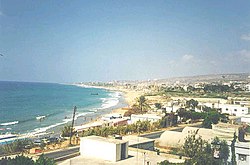This article needs additional citations for verification. (September 2018) |
Jiyeh
| |
|---|---|
City | |
 Jieh coastline | |
| Coordinates: 33°39′56.51″N 35°25′36.46″E / 33.6656972°N 35.4267944°E | |
| Country | |
| Governorate | Mount Lebanon |
| District | Chouf |
| Government | |
| • Mayor | Dr George N Azzi |
| Elevation | 0 m (0 ft) |
| Time zone | UTC+2 (EET) |
| • Summer (DST) | UTC+3 (EEST) |
| Dialing code | +961 |
Jieh (or Jiyé, Jiyeh, Levantine Arabic: الجية, romanized: Žiye) is a seaside town in Lebanon with an estimated population of 5000[1], 23 km south of Beirut, in the Chouf District via a 20-minute drive along the Beirut to Sidon highway south of the capital. In Phoenician times, it was known as Porphyreon and was a thriving natural seaport, which still functions today. The town is also known for its seven-kilometre sandy beach, which is a rarity along Lebanon's rocky coastline.
The Biblical prophet Jonah was said to have landed on its shores when he was spat out of the giant fish described in the Hebrew Bible, and a temple was built which stands until today.[2] Many invaders passed through Porphyreon such as Tohomtmos the Egyptian who landed his soldiers on its natural seaport in order to fight the North. Alexander the Great relaxed on its shore preparing for the attack on Tyre. St Peter and St Paul also walked through Jieh several times.[3]
In modern times Jieh took some of the harshest blows of the Lebanese Civil War that raged from 1975 to 1990. Being a coastal town made it vulnerable to the countless numbers of Palestine Liberation Organization raids on the area, as well as Israeli army invasions during the 1980s, [4], the worst being on January 20, 1976.[5]
During the war, the Progressive Socialist Party controlled the seaport at Jieh. In March 1989, General Michel Aoun established a blockade of the port, which resulted in artillery exchanges between his forces and a combination of PSP, Lebanese Resistance Regiments, and the Syrian Army in Beirut and the Chouf. At least 90 people were killed and several hundred wounded.[1][2] Jieh is being rebuilt, albeit at a slower pace than the nearby capital city of Beirut.
- ^ Middle East International No 346, 17 March 1989, Publishers Lord Mayhew, Dennis Walters MP; Jim Muir pp.6,7
- ^ Middle East International No 347, 31 March 1989; Jim Muir pp.3,4

